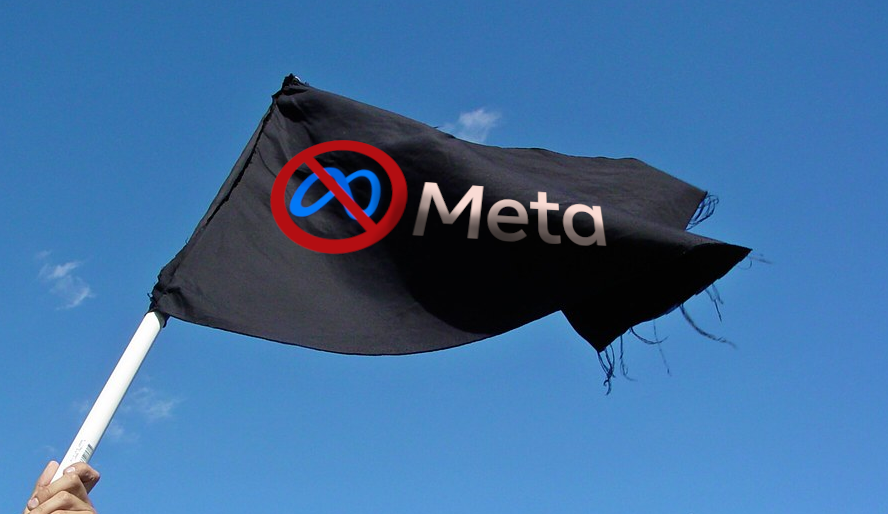Are there any criteria one must meet to be allowed to use ActivityPub? And who defines them?
I mean, it’s a protocol. Nobody needs to “allow” you to use it any more than HTTP; Meta can set up a service and they’re good to go.
Whether others will want to federate with them is the question.
It sure is suspicious how meta bothers to do the NDAed meetings though. If all they wanted was to build a product from scratch, they wouldn’t have had to ask.
Yea, they’re afraid of potential backlash and wanted to float ideas in a safe space.
Yeah, it’s the same way that nothing is stopping you from creating your own internet with all the same protocols that is completely separate from the world wide web or whatever you want to call the “real” internet.
Yes, I see it the same way. probably I misinterpreted the “block” language.
Right yeah, understandable. That’s more about people running instances saying that they won’t federate with Meta, ie. they won’t connect to Meta’s ActivityPub service (and won’t allow it vice versa, naturally)
It’ll be interesting to see what happens with this in the long run. I think the fediverse see’s Meta’s EEE play coming from a mile away compared to previous examples of big corps killing a standard. If Meta really does fork ActivityPub, I could see two webs of federation existing side by side. Enough of the fediverse is against Meta’s integration that Meta breaking the ActivityPub standard won’t force everyone to follow along. If enough instances stick to spec, then there’s still a fediverse to interact with on spec. Some will if they think the large user base Meta brings is worth it, but not all.
The concern is if they don’t fork yet, grow a huge userbase that dominates the fediverse and app landscape, then start messing with the underlying protocol to their advantage. Look at what Google did with browsers and email as an example.
That’s where the fediverse already expecting an eventual fork makes me think actions like preemptive defederation will keep meta from totally dominating. Sure the web of meta’s instance and instances that federate with meta will have a higher population, but that doesn’t lessen the number of members currently in instances that defederate meta and stick to spec. Most ActivityPub based platforms aren’t being run for profit and just want to run their own community so there isn’t an inherent need to follow any changes that meta eventually does or does not make to chase more users. If an instance defeds meta, then what meta does has zero effect on them. As long as enough do that (and the current energy seems to be that enough will) then you still have a healthy, if small, fediverse doing it’s own thing without meta.
And XMPP with Google Talk.
That website’s background is giving me some 1980s Macintosh vibes. I like it!
Edit: I went ahead and made a Macintosh background image to use on my desktop. Only 87 bytes!
Bro fuuuuuuck that company. That company is the definition of evil. As if dividing our country and selling off all our private data wasn’t bad enough for them.
Why doesn’t the article write about the actual threat to the fediverse? Embrace extend extinguish is such a common tactic it’s hard to imagine this isn’t what Facebook is doing.
Especially since they’ve already done it with XMPP
I think fighting this will be a mistake. Instances ran by the likes of Tumblr and Meta can only bring more people into the fediverse, and when they’re in it will be easier for them to move around.
The great thing about AcitivityPub is it lets the people who want to be in larger more centralised servers connect to those who don’t fairly seamlessly.
Your sentiment though well placed seems to be incorrect, there is a big risk.
https://en.m.wikipedia.org/wiki/Embrace,_extend,_and_extinguish
Good! Meta has proven time and time again that them and their services are not to be trusted. Deplatforming that trashfire before it even starts is a smart move.
I’m going to assume you misspoke there, but the notion of fediverse instances “deplatforming” Meta is… quite the notion.
Defederating from Meta is not so much “deplatforming” them, as refusing to be in their platform.
Maybe not the right word to use, but the fediverse coming together in agreement to not federate with “Threads” takes away a lot of the benefit Meta gets from creating a federated service in the first place. It’s basically pulling the rug out from under Meta before they’ve even taken a first step on it. It’s a smart move and I support it 100%
No it doesn’t, because the only benefit Meta gets from creating a federated service is to have the same back of the box feature as BlueSky.
Like, there is literally no other advantage for them. The paranoid assumption that this is a ploy to remove competition is ludicrous. Nothing about ActivityPub competes in any meaningful way with Meta. If I had to bet, the entire concept is fully a PR move.
Meta has the users, over 1 Billion. Shouldn’t we be trying to get those users to transition to open source? They can scrape everyone’s data now and even if instances defederate.
Read this. You’ll understand the issue a little better.
Federation as an ethical concept is completely foreign to Meta. Most of their users LIKE what they have: a huge monolithic social media company. If they want to use something federated, they will make the effort to switch. Might be worthwhile to educate some of those users…maybe. But not to take on Meta wholesale. I agree that eventually the whole concept of this federation would become defunct or at best an anomaly.
I’ll edit this comment when I get to my computer to link to a great article about this and a history of companies effectively killing federated services .
Edit: article here https://ploum.net/2023-06-23-how-to-kill-decentralised-networks.html
But the main issue isn’t the data. It’s that when 99% of the users are coming through a company, they have too much power when it comes to updates. Meta can effectively control how the fediverse grows. And if they decided to defederate it’s the normal Lemmy and kbin users who are forced to use meta services to keep in contact with the same people
But here’s my thing with that argument, which is valid btw, but why would I want to keep in contact with the “head in the sand” people who continue using Meta’s instances (or whatever monster they end up creating)? I can’t imagine anything meta could offer me that would make me use their fediverse product. And the people that migrate over to them - okay? have fun supporting an evil corporation that’s using you as a money printer. Sayonara.
I mean… because those people include all my friends and family? It was not a big problem to leave Twitter, which was used by only a couple of people and not exclusively. If there is an ActivityPub social media site where there is you guys and one defederated one where there’s all of them… well, I’m gonna go with them.
Just so we’re clear, unless you make AP no longer open, defederating from Meta if they’re around here means they have the network effects, not Mastodon or the rest of the pre-existing instances.
ತ_ತ
why would I want to keep in contact with the “head in the sand” people
Forget contacts. Imagine Meta has
- poured way more developing hours in their fork than the FOSS community ever could
- the most effective and easy to use mod tools
- the best search tools for finding communities, topics and everything else (by a margin)
- free instance hosting
- every major wish list feature implemented
- a working feed with endless content you actually find interesting
- a vibrant community for every niche interest you might have
- advanced development so much that it feels a couple versions ahead
The more money they throw at this, the more people will feel tempted to join or at least try their service. It offers objective benefits. It would feel like using lemmy 0.09 when others already enjoy 0.18.
I believe this is the article you were going to link: https://ploum.net/2023-06-23-how-to-kill-decentralised-networks.html
Best reading I had in the week
First of all, this is Meta attempting to co-opt and take over the fediverse.
Second, if I want to see content from my friend’s racist grandma I would be on facebook.
Outside of the US everybody is still on Facebook. I used to work on a pretty young company doing work in tech, and all of those guys are active on FB but not on Twitter (or here, for that matter).
I am outside the US. I have to interact with fb for work occasionally, sure. Less frequently these days.
That doesn’t mean I need or want Meta all up in my fediverse account, any more than I needed it linked to my reddit. It’s just not necessary to do that.
Also outside the US, Facebook has been heavily implicated in incitement to genocide over a period of years. They are not a trustworthy or ethical company.
I mean… I hate to break it to you, but no company is “trustworthy or ethical”.
Not under the current set of incentives, not unless forced by regulation.
If the “fediverse” needs unregulated, unsupervised ethical behavior from all participants to survive, it won’t survive. Ditto for democracy, for the record.
That’s a bit of a false dichotomy.
All companies are not created equal.
Inciting a genocide for years, followed by actively impeding a genocide investigation by the International Criminal Court, that’s a really high bar of crappy that not that many will reach.
Not wanting to federate with something like that, is not the same as a demand for ethical purity - that’s argumentum ad absurdum.
The fediverse doesn’t need to federate with huge multinational for-profit companies that have a proven track record of anti-competitive behaviour. We have much to lose and little to gain.
So that stance effectively becomes a size cap. ActivityPub is free! You can make your instance and join the club! Unless you’re big, because we’re not selling out and we were here before it was cool.
Hey, don’t get me wrong, I’m not here to defend Meta’s track record. They are guilty of destroying liberal democracy. But all social media is. I’m not convinced that the iterations of social media hosted currently in the “fediverse” have any in-built safeguards against that beyond being small and mostly made up of like-minded people.
What I’m saying is that the guardrails must be structural and regulatory. I don’t care if Meta destroys democracy while federated with Mastodon or stand-alone, I care that they don’t destroy democracy and get appropriately punished if they do.
We don’t need billions of users here; just a healthy community.
Many people still miss their niche topics. Some size is required for certain things to become viable.
I think this post is the most important thing that all these “Why would you block Meta?! They’re a huge source of potential growth!!” people don’t understand – who cares about growth? This “growth and user counts are the only metric that matter” mindset is exactly why we all fucking loathe Facebook/Meta/etc. That exact attitude is what makes them so despicable.
Yeah, to Meta growth=money. Fediverse (generally speaking) isn’t after money… we want community. Healthy growth is fine - meta’s mutant hormone growth isn’t what we want.
We don’t need them.
You can defederate from their server, but if they “embrace, extend, extinguish” the ActivityPub specification, then the game is over just as well.
If we are not federated with them, we are not obliged to follow their changes to the specification.
Luckily ActivityPub it’s not the only federated protocol…
I don’t think that’s the case here. Enough of the fediverse is resistant to Meta’s play here to keep a significant chunk of ActivityPub platforms running on spec and able to interact even with a Meta-fied version of ActivityPub existing. Other examples of EEE happening to open source standards seem to start with the community generally trusting the big corps to respect the standard where here no one expects Meta to play nice. The fediverse is an internet within the internet and Meta’s biggest bargaining chip to join up is a large user base but if the fediverse is fine staying small (which I think it is) then there’s no need to play Meta’s game.
Cool, so what can we do? I would like to join the army fighting off the meta hordes!
Simply by advocating in fediverse to defederate Meta. That’s it.
Okay, someone explain to me cus i apparently don’t have the critical thinking skills to figure it out on my own.
What does Meta want from joining the fediverse? What is the draw for them???
There’s a business strategy called embrace, extend, extinguish that they’ll try to use to snuff out the fediverse.
They’ll make a bespoke federated service, collect all the data of their users (and all the people on other networks their users interact with), make it all shiny and fancy and add a ton of improvements most networks don’t have yet. And if they can reach a critical mass of users, they can track a huge cross section of federated activity, and force networks to play by their rules or lose access to their entire userbase. It’s the same thing google did to email.
I’m not sure blocking Meta is worthwhile in the long term. Say what you will about email, you still have some degree of choice over your host. I want better for the fediverse, but that’s still a marked improvement over mainstream social media.
In the short term, Meta wants to kill Twitter by collecting all its A-level users. I think this would be good for the fediverse, these are news outlets and poltiicians and etc making posts most people want the option to see in their feed. These are also users who want no-fuss platforms with some amount of “customer service”, and mastodon.social is simply not ready to provide that.
The issues it poses to re-centralization are an inevitable threat as the Fediverse grows. Unless there is a concrete plan to build protections and this is a stop-gap effort, I’m not yet convinced it’s worthwhile.
Um, isn’t everything everyone does on the fediverse public? I assume it’s all being tracked already. By search engines as a bare minimum, but anyone else (including Meta) who does any kind of research/etc. And they don’t need to be federated to do it, they can just crawl the network with HTTP.
As for “forcing networks to play by their rules” I don’t see that happening, and Google hasn’t done it with email. Gmail doesn’t have enough marketshare for that. At best they’ve forced people to make sure they have good outbound spam filtering. That’s not just google, every email provider (including small on premise office mail servers) has that policy.
I’m not saying we should federate them (personally I’m undecided) but your explanation hasn’t convinced me.
Instance owners (can) see way more info about you. A rando scraping public posts can’t tell what device a user is connecting from, what posts they’re looking at and for how long, where to most effectively inject ads, and then correlate all that with gps and sound recordings they collect via their app they’ve convinced people to install.
The social media part of social media apps has always been the secondary feature. Something like 90% of users lurk anyway, the only way they’re getting data on lurkers is a man-in-the-middle attack.
Also, Gmail is very strong in the email space. It doesn’t matter whether your server ever sends a single piece of spam, Gmail has a history of throttling mail servers’ ability to send to Gmail accounts.
Facebook will never know any of that about me, since I won’t ever sign up for their instance.
On top of that, you’ll also have to make sure that your instance admins defed with Meta
I think most people currently on lemmy would agree, but most people aren’t on lemmy. Like it or not, if Meta started a fediverse instance tomorrow, 90% of the fediverse would end up going through it. They would just make it so easy that most people wouldn’t even know they were in the fediverse (which I still believe is a better world than how it currently is).
Then your choice isn’t just “do I join a meta instance”, but also “do I interact with users/communities” on a meta-owned instance? The upside will obviously be the amount of content (ex. populated niche communities) available. The downside is that Meta will mine anything and everything they can from you. I do think lemmy is architected in such a way that they won’t have lurking data because your local instance “clones” threads for lurking by local users, so maybe it’s not that big of a deal. DMs would still not be encrypted though, and meta certainly won’t endorse communication over matrix.
deleted by creator
I wish I remember where I read this recently, but supposedly any email provider outside of like the main 5 will have a lot more trouble getting through gmail spam filters, which is a major push towards getting people to use gmail or one of the other main providers
(and all the people on other networks their users interact with)
This reminded me of the fact that Meta creates “ghost” profiles for people who they know exist, but who don’t use Facebook
I think people are a bit confused about how this supposed “embrace, extend, and extinguish” thing is supposed to work, as well as how the proposed pushback is supposed to work and even how federation is supposed to work.
As others say, tracking is trivial and doesn’t require federation. “Losing access to their userbase” is what’s being proposed here as a solution, not a threat. And last I checked Google did not “extinguish” email and nobody using other email providers lost access to Gmail users.
I think people are reacting to “Meta bad” and assuming “anti-Meta good” without having a good grasp of why or how those things are supposed to function.
To the email point, it’s actually much more difficult to set up your own email than it used to be, exactly because google servers will not accept email from unknown providers that don’t meet their own standards. It didn’t extinguish email, true, but it did help centralize it around a handful of providers that can keep up to date with google’s whims to get reliable deliverability.
Come on, we’re going to pretend that there aren’t legitimate reasons for that beyond an alleged takeover of email by Google? It’s like the memetic XMPP example, fallacious twice over. Not only have netiher XMPP nor email been “extinguished”, but a lot of the effects people have noticed are atributable to other elements beyond Google’s intervention.
In this case if you’re going to assume incoming email filters are “Google’s whims” and not the fact that email as a whole exists solely for in-company communication and spam I’m gonna say your read on the situation is at least a little bit disingenuous.
I mean google’s whims as in they’re making decisions on their own and everyone else just has to go with it. I’d rather these problems were solved collectively.
I think it’s a little silly to define extinguish as literally destroyed. I think of it as a permanent wound. With XMPP, the belief by people that both networks would inter-operate and the subsequent change left a permanent wound on XMPP adoption. I’m not sure how things would’ve gone otherwise, and I’m equally skeptical of the people holding onto that as the sole reason for XMPP’s failures, but it certainly was an inflection point for them.
Did XMPP fail harder or less hard than everything else used for messaging in 2005? Because that’s when that happened. Was it better or worse to be embraced as a protocol by Google or to get purchased by Microsoft like Skype? Did Microsoft Messenger, which was EVERYWHERE back then do better or worse?
I think if you don’t mean “extinguish” as “deliberately destroyed”, then you’re talking about a hypothetical where a piece of software would, in your opinion, have done better if not for an event that did happen, and unless you have a time machine that’s fundamentally a guess.
So yeah, I would vehemently disagree that Google has disrupted email. Spam farms disrupted email. The rise of instant messaging and web 2.0 disrupted email. Google had a massive stake in their email business and tried to protect it by pushing back against at least one of those things. And they kinda failed.
So yeah, I haven’t seen compelling evidence that big companies using open source software or protocols is a bad thing for open source software or protocols. What I’ve seen is evidence that they either become proprietary alternatives (Android/Chrome OS as versions of Linux) or they coexist and do better or worse as the market would have them (email, Blender, Linux itself).
My honest appraisal here is that people dislike Meta (rightfully so) and they enjoy the punk, independent vibe of the “fediverse” so while three months ago they were all “these capitalist dinosaurs need to accept that decentralized protocols are the future” now it’s all “don’t sell out to capitalist dinosaurs who want to buy out our decentralized protocols”.
I get it, but it doesn’t make much sense, seen dispassionately.
They were bleeding users so they want some ways to tap into existing user pool and they think it is easy to get that by simply federating, but they are about to find out the hard way why it won’t go the way they want.
Meta apps have a couple billion users. The fediverse has maybe ten million.
I really don’t think that’s the reason they’re considering ActivityPub.
I assumed over the years that users count would have been evaporated, so do we have current user counts for it?
Why would you assume that? I think Facebook has reported a loss of users maybe one quarter, ever? They’re flirting with 3bn these days, as far as I can tell.
Just that I don’t bother to care about them for years until now that they are trying to mess with Fediverse.
Well, like we’ve said elsewhere in this, they are orders of magnitude larger than the fediverse. Absorbing users or data is almost certainly not their motivation here.
It seems like a big commitment to federate, so one have to ask what really their motivation. I don’t see anything else than just tapping into user pool and trying to ride the wave. Do you have other ideas?
I’d imagine they see a new platform/user base they can dump a ton of money into and slowly take for themselves. At very least, another well of user data. If their app was significantly better than the smaller dev’s, would you mind if there was an ad or two?
I am hoping we keep their grubby hands off, so there is no chance of them destroying this growing platform.
Honestly i would never use another meta product, idc how nice their app would be. i like my funky jerboa app and that’s that! Lol. But - i get your point. A lot of users prefer usability over privacy.
…usability over privacy.
^ The eternal struggle that most likely leads to our eventual downfall as a society.
This was a very illuminating view from another post
Read this one earlier. Great article, wonderfully written.
Does anyone know what there business model could be here? Technically they could get access to all federated content, just as regular instances do. But legally they don’t own that content nor do they know what country it origi ated in. This sounds like a legal nightmare to me. Would they even be allowed to process content in any form created by EU users under GDPR?
It’s not about any business model. It’s about killing competition. https://ploum.net/2023-06-23-how-to-kill-decentralised-networks.html
This is exactly it. They’ll dump a few billion new users on the network and then graciously offer some developer time to Mastodon, Lemmy et al since there’s no way they’ll currently be able to take the sort of loads we’re talking about.
Might even offer to host your Fediverse instance for free, as you struggle to deal with the load caused by activity going up 1000x
deleted by creator
That would be an option. However, non-Meta users would not have agreed to any terms that grant them a right to use the content. So, I could imagine that individual users could object to them using their content or even ask for compensation if they use it in any way to make money. Then again, Meta has the lawyers to fight this out. Until there is a final decision, maybe they already killed the competition as @AkumaFoxwell@feddit.de suggests…
I question how much legal ground there’d be for individuals “withdrawing consent” to be incorporated into their platform. I think the legal question would be, “what reasonable expectation of privacy did the users have by posting content to an open-sourced network?”. I’d guess their argument would be “well, they shared their content on an open network that we are also a part of.”
They’ve been dealing with user attrition and content degradation, I imagine this could be a way for them to solve that problem. They could even just develop an app that connects to the fediverse, they don’t even need to start their own instance. They could then feed ads and gather data based on their users data.
I think this will be harder to stop than we’re thinking.
I think this will be harder to stop than we’re thinking.
Fully agree. We can only decide if we want to give them a chance to be good citizens of the fediverse or not.
I don’t really even think we have that choice. We can de-federate if they spin up an instance, but I don’t even know they need to do that much. We’ll see I guess
Yea I mean, I don’t think anyone could actually believe that Meta is acting in good faith here, or even capable of acting in good faith in general. As much as it’s exciting to think about plugging a billion new users into the Fediverse, it would no doubt be done in a way designed to enrich Meta at our expense.
Embrace, extend, extinguish.
Surprised actually they beat Microsoft to the punch
Yeah, but Microsoft has no social media presence. They tried to get into the market (somewhat) with the kin and failed. And imho recently they have been struggling to attract users in new markets.
they would have to prove that they are in good faith to be able to gain our trust in federating with them. but with their past bullshit, its hard to do so.
Zuck is too much of a wolf in turd’s clothing. Wait no, that’s not right. A bastard in a turd’s clothing. Wait.
‘A skidmark on the boxers of humankind’ is the phrase you’re looking for I think.
A Lore in Data’s clothing?
I like to think of him as more of a lizard man than Android, but you’re on the right track!

































